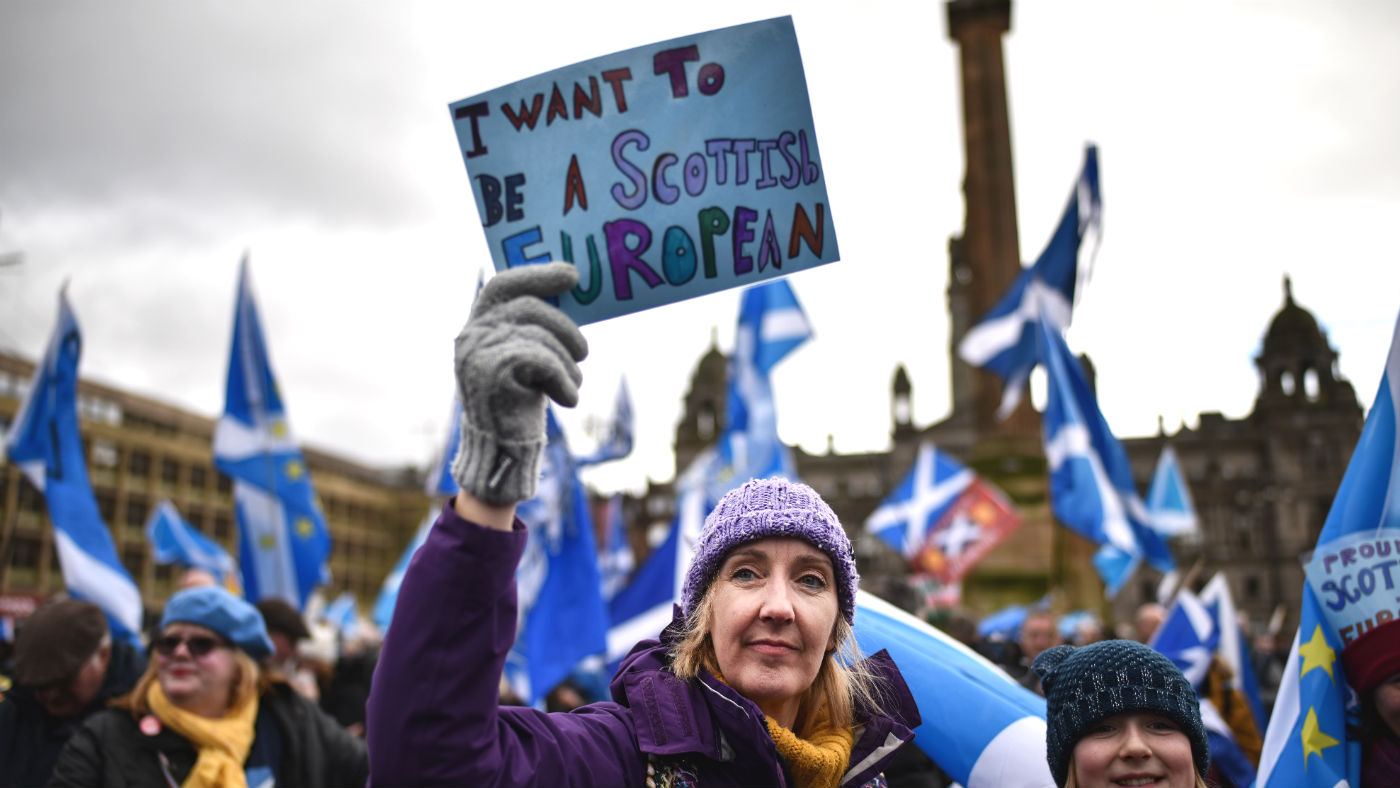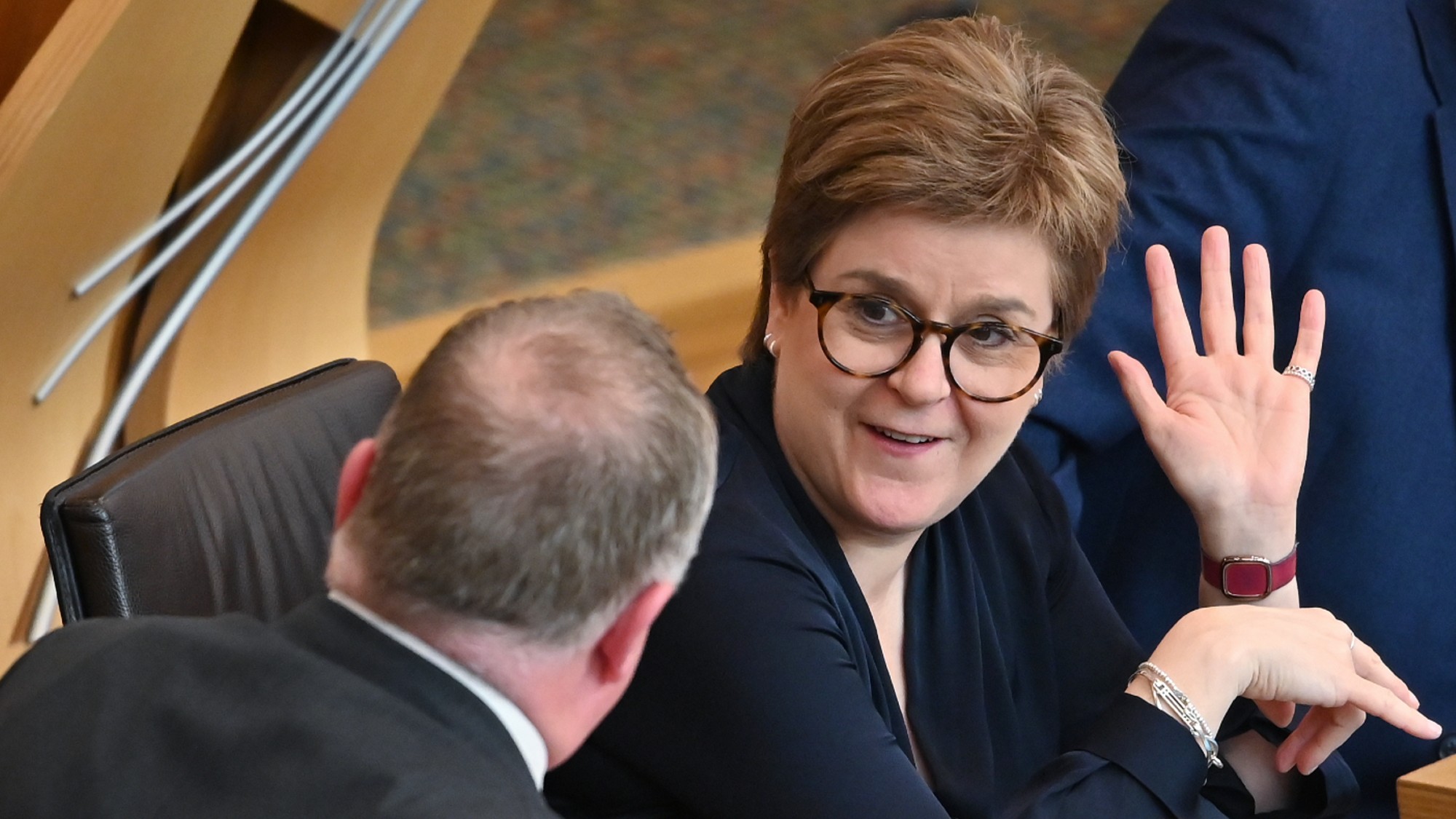Queen dragged into Scottish independence debate
David Cameron reveals he asked monarch’s advisors for help in 2014 just days before referendum

A free daily email with the biggest news stories of the day – and the best features from TheWeek.com
You are now subscribed
Your newsletter sign-up was successful
Scotland’s First Minister Nicola Strugeon has suggested the Queen should refuse to be drawn into a future vote on Scottish independence, after David Cameron admitted he subtly asked the monarch to intervene in 2014.
Speaking in a BBC series coinciding with the release of his memoirs, For the Record, the former prime minister recalled how he was on a weekend break at the royal Balmoral estate in the Scottish Highlands in September 2014 when a YouGov survey put the campaign for Scottish independence in the lead for the first time.
Cameron say the poll hit him “like a blow to the solar plexus” and led to “a mounting sense of panic” which prompted him to ask the Queen’s advisors for help.
The Week
Escape your echo chamber. Get the facts behind the news, plus analysis from multiple perspectives.

Sign up for The Week's Free Newsletters
From our morning news briefing to a weekly Good News Newsletter, get the best of The Week delivered directly to your inbox.
From our morning news briefing to a weekly Good News Newsletter, get the best of The Week delivered directly to your inbox.
“I remember conversations I had with my private secretary and he had with the Queen’s private secretary and I had with the Queen’s private secretary, not asking for anything that would be in any way improper or unconstitutional, but just a raising of the eyebrow, even you know a quarter of an inch, we thought would make a difference,” he said.
The “raising of the eyebrow” came the following Sunday, when the Queen told a well-wisher “I hope people will think very carefully about the future”.
The Daily Telegraph says her comments were “seized on by many pro-union campaigners as an indication that the Queen was urging voters to keep the UK together”, with Scotland voting to stay in the UK by a 55% to 45% margin just days later.
In the run-up to the 2014 referendum it was reported that the Queen was herself becoming increasingly concerned about the outcome of the vote. Yet while The Guardian reports that Sir Jeremy Heywood, then cabinet secretary, and Sir Christopher Geidt, then the Queen’s private secretary, “had discussed how she might register her concern at the prospect of a yes vote for independence while remaining ‘impartial’, Cameron’s remarks are an explicit admission that he sought intervention”.
A free daily email with the biggest news stories of the day – and the best features from TheWeek.com
HuffPost UK says independence supporters “are likely to be furious at the revelation that the monarch apparently intervened in politics”.
Patrick Harvie, the co-leader of the pro-independence Scottish Green party, asked Sturgeon whether the UK government could be trusted not to seek the Queen’s help again if a second independence referendum takes place.
“Another referendum is coming, we all know that,” Harvie said. “Does the first minister think that we can trust that the head of state won’t once again be invited to interfere in the vote of a sovereign people?”
Sturgeon replied: “Well, that should always be a matter for the Scottish people. We know that support for independence is rising, demand for another independence referendum is rising. Scotland does have a right to choose its own future and I think the revelations, if I can call them that from David Cameron today, say more about him than anybody else, and really demonstrate the panic that was at the heart of the UK government in the run-up to the independence referendum five years ago.”
According to a source quoted by the BBC, Cameron's comments about conversations he had with the Queen during the referendum on Scottish independence led to “an amount of displeasure” inside Buckingham Palace.
The source said that “it serves no one’s interests” for conversations between the prime minister and the Queen to be made public.
“Just as the first rule of Fight Club is that you do not talk about Fight Club, the first rule of the relationship between the prime minister and the Queen is that you never, ever talk about the relationship between the PM and the Queen” says BBC royal correspondent Jonny Dymond.
“It is difficult to imagine anything other than horror in the Palace at David Cameron's revelations. Not just because he has broken the first rule. But because he has made it painfully clear that in 2014 he used the Queen for his own political purposes. And that she and her advisors thought that was OK”, he adds.
The London Evening Standard says the Queen’s dealings with the current prime minister are “also in the spotlight” after Boris Johnson told her to order the suspension of Parliament - which is the subject of a legal battle at the Supreme Court.
“The two cases are very different; but they both highlight the dark greys of the Queen's constitutional position, the discretion she has or lacks, under extraordinary circumstances, to speak out and act,” says Dymond.
-
 What to know before filing your own taxes for the first time
What to know before filing your own taxes for the first timethe explainer Tackle this financial milestone with confidence
-
 The biggest box office flops of the 21st century
The biggest box office flops of the 21st centuryin depth Unnecessary remakes and turgid, expensive CGI-fests highlight this list of these most notorious box-office losers
-
 What are the best investments for beginners?
What are the best investments for beginners?The Explainer Stocks and ETFs and bonds, oh my
-
 How corrupt is the UK?
How corrupt is the UK?The Explainer Decline in standards ‘risks becoming a defining feature of our political culture’ as Britain falls to lowest ever score on global index
-
 The high street: Britain’s next political battleground?
The high street: Britain’s next political battleground?In the Spotlight Mass closure of shops and influx of organised crime are fuelling voter anger, and offer an opening for Reform UK
-
 Is a Reform-Tory pact becoming more likely?
Is a Reform-Tory pact becoming more likely?Today’s Big Question Nigel Farage’s party is ahead in the polls but still falls well short of a Commons majority, while Conservatives are still losing MPs to Reform
-
 Taking the low road: why the SNP is still standing strong
Taking the low road: why the SNP is still standing strongTalking Point Party is on track for a fifth consecutive victory in May’s Holyrood election, despite controversies and plummeting support
-
 Nicola Sturgeon's memoir: making the personal political
Nicola Sturgeon's memoir: making the personal politicalTalking Point Former Scottish first minister attempts to set record straight in 'Frankly' but does she leave more questions than answers?
-
 What difference will the 'historic' UK-Germany treaty make?
What difference will the 'historic' UK-Germany treaty make?Today's Big Question Europe's two biggest economies sign first treaty since WWII, underscoring 'triangle alliance' with France amid growing Russian threat and US distance
-
 Is the G7 still relevant?
Is the G7 still relevant?Talking Point Donald Trump's early departure cast a shadow over this week's meeting of the world's major democracies
-
 Angela Rayner: Labour's next leader?
Angela Rayner: Labour's next leader?Today's Big Question A leaked memo has sparked speculation that the deputy PM is positioning herself as the left-of-centre alternative to Keir Starmer